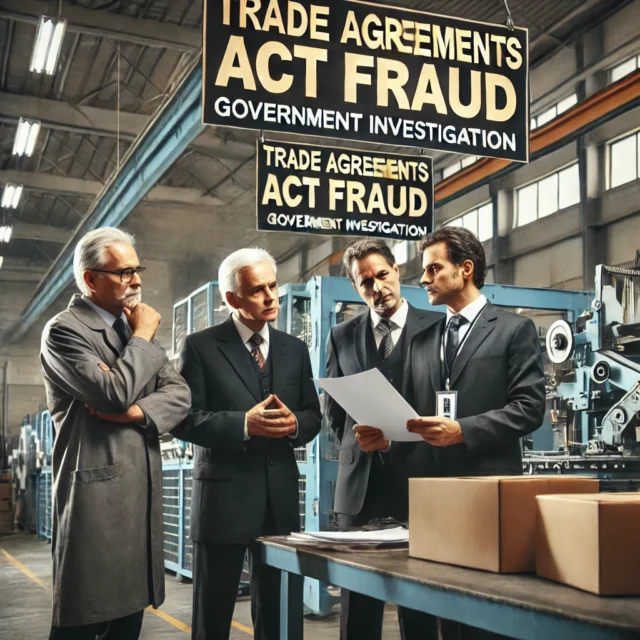What is TAA Compliance Requirements? TAA Compliant Meaning
Is the Government Investigating Your Company for Trade Agreement Act TAA Compliance Fraud and False Claims Act Violations? Are You Armed to Avoid Jailtime and Minimize Civil and Criminal Penalties? We Can Defend You.

What is TAA Compliance?
Do Not Get Caught in False Claims Act Liability from the Department of Justice (DOJ)
Definition of TAA: TAA is the abbreviation of the Trade Agreements Act, a federal law enacted in 1979 to promote fair and open international trade among willing countries. Trade Agreements Act compliance also implements many multilateral and bilateral international trade agreements and other trade initiatives. The TAA certification rules require the United States government to only buy end products that are made in the U.S. or in a listed designated TAA-compliant country.
- The bottom line is that when you sign a TAA certificate of compliance to get a federal contract, federal law enforcement agencies will come after you regardless of your reasoning.
TAA compliance applies to companies and manufacturers who sell their products to the federal government. Companies and their CEOs must certify that their products are made in the United States or a designated country, in compliance with TAA requirements.
TAA Compliant Meaning: To be Trade Agreements Act compliant, products sold through the GSA Multiple Award Schedule (MAS) Contract must be manufactured or “substantially transformed” in the U.S. or a TAA-compliant country.
There are 3 different categories of federal TAA-compliant products, including
- domestic end products – made entirely in the United States
- designated country end products – made in a country that has a trade agreement with the United States (TAA Compliant products made outside of the U.S.)
- foreign end products – made outside of the United States and do not meet the TAA requirements for designated country end products
What Must You Do to Be TAA Compliant?
For your products to meet TAA compliance requirements, They must either be made in the United States or one of the statutorily designated countries, or they must have undergone a significant change in form, character, or primary function in one of these countries. This TAA compliance requirement is known as substantial transformation.
The TAA limits the country of origin for products sold through your GSA Schedule contract. You can only sign a TAA certificate for:
- Articles that are wholly the growth, product, or manufacture of the U.S. or a designated country, or
- Articles that are “substantially transformed” in the U.S. or a designated country into a new and different article of commerce with a name, character, or use distinct from that of the article or articles from which it was transformed.
There are many resources available to help businesses understand be TAA compliant and meet TAA compliance requirements, including:
Watch the Video Below to Learn More About TAA Compliance Rules Requirements
Whose Responsibility is it for TAA Compliance Requirements?
It is your responsibility as a government contractor to make sure that your product information is accurately incorporated into the GSA contract and displayed on the GSA schedule throughout the life of the contract. You should review your TAA country of origin of products you offer on your GSA schedule.
Can You Just Point to Your Subcontractor’s Representation to Defend Against TAA Compliance Fraud Charges?
It depends. The hard approach is that the federal government, as a party to the contract, generally has no privity of contract with your subcontractors. However, many prime contractors try to escape liability by pointing to the Trade Agreements Act compliance representation of their subcontractors or manufacturers. It would help if you always got written representation of compliance with the Trade Agreements Act from your subcontractors and manufacturers. This is an area where our TAA compliance False Claims Act attorneys can help.
You still have to be very careful when your manufacturers, suppliers and subcontractors represent to you that their products or materials are TAA-compliant. You are not always completely off the hook. Some courts may inquire further as to how much did you conduct due diligence on this matter. Did you simply accept the TAA Certificate of Compliance as true? Sometimes you can rely on the expertise of your subcontractors. See United States ex rel. Ervin and Assoc., Inc. v. The Hamilton Sec. Grp., Inc., 298 F.Supp.2d 91 (D.D.C.2004). However, you cannot always count on this. See United States ex rel. Folliard v. Govplace, 930 F. Supp. 2d 123 (D.D.C. 2013)
In United States ex rel. Compton v. Midwest Specialties, Inc., 142 F.3d 296 (6th Cir.1998), the United States Court of Appeals for the Sixth Circuit held that a supplier “knowingly” made a false claim to the government, where the supplier delivered goods to the government knowing the goods had not been tested and without knowing de facto whether the goods otherwise conformed to specifications. Id. When it comes to Trade Agreement Act compliant certification to the federal government, you should not sit and be idle. You must inquire and show due diligence. See also TAA compliance rules in 52.225-5 Trade Agreements.
TAA Threshold 2024 – 2025 – Apply to You TAA Certificate of Compliance Assessment
The U.S. Trade Representative has determined the U.S. dollar procurement thresholds, effective on January 1, 2024, for calendar years 2024 and 2025 as follows:
World Trade Organization (WTO) Agreement on Government Procurement
A. Central Government Entities listed in U.S. Annex 1:
(1) Procurement of goods and services—$174,000; and
(2) Procurement of construction services—$6,708,000.
Are You Under Investigation a False Claims Act TAA Compliance Case? Are You Facing Criminal Federal Charges?
Federal law enforcement agencies such as the Office of Inspector General (OIG) and Department of Justice (DOJ) have ramped up their TAA compliant investigations of small businesses, prime contractors, subcontractors, suppliers and manufacturers. As a result, record numbers of corporations and CEOs are charged and or convicted for Trade Agreement Act False Claims Act crimes.
At Watson & Associates, LLC our Trade Agreements Act criminal defense lawyers can represent you from the investigation stages through the indictment and trial stages. Were you raided with a search warrant – was it valid? Find out more.
Nationwide TAA Compliance Lawyers and Trade Agreements Act False Claims Act Defense Lawyers
Theodore P. Watson, Esq (US Supreme Court Licensed Attorney) – Practice Group Lead. Call him at 1.866.601.5518. At Watson & Associates, with law offices in Colorado and Washington, DC, our top-rated federal government investigations attorneys have experience working for federal contracting agencies.
Call him at 1.866.601.5518. At Watson & Associates, with law offices in Colorado and Washington, DC, our top-rated federal government investigations attorneys have experience working for federal contracting agencies.
We understand the nuts and bolts of the government’s investigation, criminal cases, and how the DOJ or even the SBA OIG develops a civil or criminal case against you.
A crucial aspect of our practice lies in the fact that many of our federal crime investigations defense attorneys possess extensive experience as government contracting officials.
We also understand how trial lawyers, and federal prosecutors in federal agencies like the DOJ and the U.S. Attorney’s Office operate.
Drawing on those valuable insights, our job is to deconstruct the government’s case and develop a legal defense in federal courts that can create leverage in the event of litigation. Contact Mr. Watson directly.
How Do You Get Trade Agreements Act Certification
For federal government contracts and state and local contracts, each company must attest to Trade Agreements Act certification. You must represent to the government that your product meets the TAA compliance requirements. It is your responsibility to perform the due diligence and show that you went through the effort to make sure that your products are TAA compliance certified.
What are Trade Agreement Act TAA Compliant Countries?
The full list of TAA compliant countries can be found HERE.
A designated TAA Contract compliant country means any of the following countries:
(1) A World Trade Organization Government Procurement Agreement (WTO GPA) country (Armenia, Aruba, Australia, Austria, Belgium, Bulgaria, Canada, Croatia, Cyprus, Czech Republic, Denmark, Estonia, Finland, France, Germany, Greece, Hong Kong, Hungary, Iceland, Ireland, Israel, Italy, Japan, Korea (Republic of), Latvia, Liechtenstein, Lithuania, Luxembourg, Malta, Moldova, Montenegro, Netherlands, New Zealand, North Macedonia, Norway, Poland, Portugal, Romania, Singapore, Slovak Republic, Slovenia, Spain, Sweden, Switzerland, Taiwan (known in the World Trade Organization as “the Separate Customs Territory of Taiwan, Penghu, Kinmen and Matsu (Chinese Taipei)”), Ukraine, or United Kingdom);
(2) A Free Trade Agreement (FTA) country (Australia, Bahrain, Chile, Colombia, Costa Rica, Dominican Republic, El Salvador, Guatemala, Honduras, Korea (Republic of), Mexico, Morocco, Nicaragua, Oman, Panama, Peru, or Singapore);
(3) A least developed country (Afghanistan, Angola, Bangladesh, Benin, Bhutan, Burkina Faso, Burundi, Cambodia, Central African Republic, Chad, Comoros, Democratic Republic of Congo, Djibouti, Equatorial Guinea, Eritrea, Ethiopia, Gambia, Guinea, Guinea-Bissau, Haiti, Kiribati, Laos, Lesotho, Liberia, Madagascar, Malawi, Mali, Mauritania, Mozambique, Nepal, Niger, Rwanda, Samoa, Sao Tome and Principe, Senegal, Sierra Leone, Solomon Islands, Somalia, South Sudan, Tanzania, Timor-Leste, Togo, Tuvalu, Uganda, Vanuatu, Yemen, or Zambia); or
(4) A Caribbean Basin country (Antigua and Barbuda, Aruba, Bahamas, Barbados, Belize, Bonaire, British Virgin Islands, Curacao, Dominica, Grenada, Guyana, Haiti, Jamaica, Montserrat, Saba, St. Kitts and Nevis, St. Lucia, St. Vincent and the Grenadines, Sint Eustatius, Sint Maarten, or Trinidad and Tobago).
What Trade Agreement Act Compliance Exceptions?
TAA compliant meaning – FAR 25.40 mentions TAA Compliance Rules Exceptions.
(a) This subpart does not apply to-
(1) Acquisitions set aside for small businesses;
(2) Acquisitions of arms, ammunition, or war materials, or purchases indispensable for national security or for national defense purposes;
(3) Acquisitions of end products for resale;
(4) Acquisitions from Federal Prison Industries, Inc., under subpart 8.6, and acquisitions under subpart 8.7, Acquisition from Nonprofit Agencies Employing People Who Are Blind or Severely Disabled;
(5) Other acquisitions not using full and open competition, if authorized by subpart 6.2 or 6.3, when the limitation of competition would preclude the use of the procedures of this subpart; or sole source acquisitions justified in accordance with 13.501(a); and
(6) Goods and services specifically excluded under individual trade agreements, such as exceptions negotiated by the U.S. Trade Representative for particular agencies. See the agency supplementary regulations.
Not sure what TAA compliance meaning is, call our TAA compliance requirements attorneys for immediate help at 1.866.601.5518 today or contact us online. Speak to Theodore Watson our Department Head.
